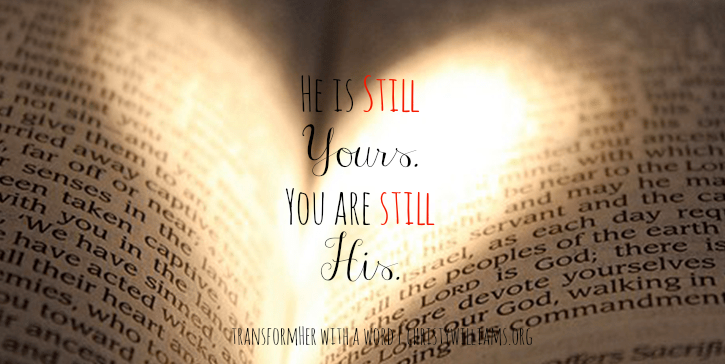You Are Still His
What if you were told to marry a prostitute or a male escort? You know, someone who, as a lifestyle, has intimate encounters with many other people. How would you respond? Isn’t marriage about faithfulness, monogamy, commitment, love, and loyalty? To marry someone who consistently sends pretty clear messages that they struggle in this area is a bit troubling, right?
This question was posed years ago in a class I attended. I must admit, I was pretty offended and disturbed at the teacher for even bringing it up. In his attempts to be “creative” he even had an image of a silhouette of a lady in heels more accurately depicting all that is associated with such a lifestyle than I was comfortable with! I thought to myself, “he could have found another way to make this point! Why this?!”
That “class” I attended was a Bible study, the teacher was my husband, and his opening question was straight out of the Old Testament. In the Book of Hosea, God tells Hosea to marry a prostitute. Yes, God. Yes, marry. Yes, a prostitute. It is debated as to whether or not Gomer was a prostitute before or after their marriage. What we do know is that God let Hosea know ahead of time that she would later turn to adultery and prostitution. So, he knew she would be unfaithful to him!
Poor guy! Right? Could you imagine such an order from God?
Guess what? You don’t have to! Like me, you are probably identifying with the wrong character in this story. Sorry! But you and I are not the “Homer’s” in this analogy. We are “Gomer.” Yes, the unfaithful one, the one prone to wander, the one prone to go after and give ourselves to someone or something other than the one true God.
This book of Hosea highlights the parallels between Hosea’s relationship with Gomer and God’s relationship with Israel. This story serves as an analogy illustrating how God chose to save us even though He knew ahead of time we would be unfaithful to Him.
The good news is if we read the entire book (which is very short, by the way), we find that even in the midst of Israel’s immorality, God mercifully offered hope, expressing his infinite love for his people (chapter 11) and the fact that their repentance would bring about blessing (chapter 14).
He is the same God today! Re-channel that “I’m disturbed and offended” energy. Embrace the truth of just how much we have in common with Gomer and be encouraged with how much we are loved by God!
If you have wandered off; if you have gone astray; if you’ve been unfaithful and failed to keep your vows to the God who saved you, it’s not too late. You are not too far off! He desires to do for you as Hosea did for Gomer. He, too, wants to tenderly deal with us in spite of our sin.
When God sent Jesus to the cross to die for people He knew ahead of time would be unfaithful to him, he did not say “die for whom?!” He said, “Not My will, but Yours be done” (Matthew 26:39).
God has not changed. He is still in love with you. He is still merciful and forgiving. He is still yours and you are still His!


Beautiful message. Yes, God loves us forever. We are His. 🙂